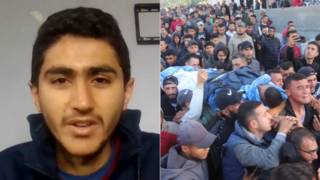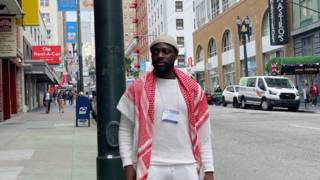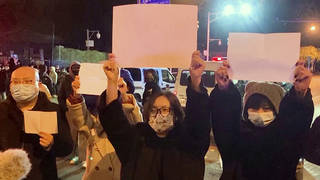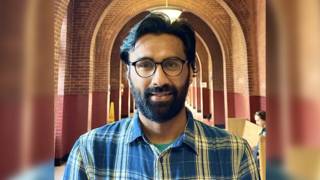
Guests
- Adrian Zenzindependent researcher and expert on China’s minority policies in Xinjiang and Tibet.
- Rushan AbbasUyghur-American activist, founder and director of Campaign for Uyghurs.
Chinese authorities have been accused of systematically separating Muslim children from their families in the far western region of Xinjiang. According to a new report commissioned by the BBC, China is rushing to build boarding schools where children, mostly from the Uyghur community, are deliberately removed from their families, as well as their language and culture. This comes as an estimated 1 million adults from the Uyghur community are being imprisoned in camps that China claims are “vocational training centers” designed to combat extremism. We speak with independent researcher Adrian Zenz, who did the research for the BBC report, and Uyghur-American activist Rushan Abbas, founder and director of Campaign for Uyghurs.
Transcript
AMY GOODMAN: This is Democracy Now! I’m Amy Goodman. We turn now to China, where authorities have been accused of systematically separating Muslim children from their families in the far western region of Xinjiang. According to a new report commissioned by the BBC, China is rushing to build boarding schools where children, mostly from the Uyghur community, are deliberately removed from their families, as well as their language and culture. Critics accuse China of attempting to culturally re-engineer minority societies.
This comes as an estimated 1 million adults from the Uyghur community are being imprisoned in camps that China claims are “vocational training centers” designed to combat extremism. Many of the children who have detained parents or other family members are more vulnerable to removal.
Well, last week, Nermeen Shaikh and I sat down, spoke to independent researcher Adrian Zenz, who did the research for the BBC report. He’s an expert on China’s minority policies in Xinjiang and Tibet. We also spoke with Rushan Abbas, a Uyghur-American activist, founder and director of the Campaign for Uyghurs. After she spoke out against China’s repression of Uyghurs last year, her aunt and sister disappeared. Her aunt has since been released, but there’s still no news on her sister. I started by asking Adrian Zenz what he found in his research.
ADRIAN ZENZ: My findings are very disturbing, and they really point to an urgent campaign on the side of the Chinese in Xinjiang to handle and deal with the fallout of having detained so many Turkic minority adults, especially Uyghurs, in the region of Xinjiang. And what they’re doing now is that, with so many cases of both parents in detention, the children are being put up into boarding facilities. There’s been a multibillion-dollar campaign to construct boarding schools that go all the way down to kindergarten, and, most recently, even a drive to establish nurseries for smaller kids, for infants, in satellite factories in villages, where they are putting women to work.
NERMEEN SHAIKH: And, Adrian, can you give us a sense—you said a multibillion-dollar campaign. Who’s funding this campaign?
ADRIAN ZENZ: This is funded by Beijing. Xinjiang is traditionally a fairly poor region, even though it has mineral resources. But about 80% of the budget of Xinjiang is actually funded by Beijing, especially the security, the police, the technology, and, of course, the internment campaign.
AMY GOODMAN: Can we step back for a moment, and you tell us—place the Uyghur community for us. Tell us who they are, how many people are there, and how these policies, what you’re calling cultural genocide, evolved and were put into place.
ADRIAN ZENZ: The Uyghurs are 11 to 12 million strong, so almost twice as many as Tibetans. They are a Turkic people, much more similar in language, culture and religion to the Turks and other Central Asians. And most of them are Muslim. And they have many more similarities to Central Asia than to Beijing. That’s also the trouble. They feel distinct. They don’t necessarily feel that they belong to China. Mao Zedong invaded the area in 1949 with his armies.
Now the trouble is that Beijing has been trying to govern this region and integrate these people into the Chinese country and into the Chinese language and culture, but the Uyghurs have been resisting this, at times also with violent attacks. Now the Chinese are launching an unprecedented campaign of putting possibly a million or more of the Uyghurs and other Turkic minorities into so-called re-education camps, where they’re being brainwashed and they’re being culturally assimilated. They’re being told not to believe in their religion. They’re being taught the Chinese language.
NERMEEN SHAIKH: And, Adrian, you’ve said in a—you wrote a recent piece for The New York Times saying that the Chinese Communist Party’s current re-education drive is an “upgraded version of the Cultural Revolution.” So, I’d like you to talk about that, and also that Xi Jinping’s government, the ultimate goal of this government is to exercise, quote, “complete ideological supremacy.” Could you elaborate on that and explain what some of the reasons are that Uyghurs can be detained? I mean, you say in the piece it includes things like putting too much gas in one’s car, refusing to smoke in public, or receiving phone calls from relatives overseas.
ADRIAN ZENZ: Yes, a very good question. In order to understand what’s really going on, we need to zoom out to the wider picture. The Chinese Communist Party is really waging a war against any competing ideology, especially organized religions. This includes Islam, it includes Christianity, but, to an increasing extent, also indigenous Chinese religions. In the Cultural Revolution in the 1970s, the Communist Party really tried to eradicate traditional belief, traditional customs, traditional culture, and especially religious belief. It was very messy. It was very uncoordinated.
What we are now seeing, under President Xi Jinping, is a very sophisticated, well-funded and technologically advanced campaign to control ethnic minorities, religious believers, including house churches. Minorities, such as Tibetans and Uyghurs, are now living in a virtual police state, where you have cameras on every street corner, where you have artificial intelligence, huge data streams, flowing into databases that are being used for predictive policing, to think this person is behaving different than they behaved yesterday. There’s examples of people who didn’t enter through the front door, but, the house, through the back door, and then this flags an alert at the police station. This is an unprecedented now internment campaign in Xinjiang, worse than ever in the history of China. And it’s the largest incarceration of a particular ethnic minority since the Holocaust.
NERMEEN SHAIKH: Well, Adrian, I mean, it is remarkable that this crackdown is occurring at the same time as China is investing so heavily in Muslim countries through their Belt and Road Initiative. Thirty-seven countries have written to the U.N. in support of China’s policies in Xinjiang. It’s especially striking that no Muslim country has signed the other letter protesting the treatment of the Uyghur population, but a number of Muslim countries have signed a letter, including Saudi Arabia, Pakistan, Oman, Qatar and the United Arab Emirates, supporting the policies against the Uyghur community. So, could you talk about this initiative by Xi Jinping and the increasing dependence of a number of countries, Muslim countries included and countries across Africa, on China, both for aid as well as trade?
ADRIAN ZENZ: China has been waiting for a long time, I believe, to step up to the international stage and to take up what it believes to be its rightful place. China, by name, is called Zhongguo in Chinese, which means the middle country or the middle kingdom. It used to be the center of its world, and it seeks to be that again.
The Communist Party is really embarking on an unprecedented global influence campaign, with the ultimate goal of ensuring its own long-term survival. It does that by exerting unprecedented influence in the world, particularly in the developing world. If you look at the letter and the counterletter, the letter supporting China’s atrocities in Xinjiang was mostly signed by developing countries, and, as you said, many of them Muslim-majority countries, were basically betraying their Muslim brothers, the Uyghurs and the Kazakhs in Xinjiang. The other counterletter was mostly signed by Western nations. And China was proudly boasting, “Look, we have isolated the West. The West has no clout over these developing countries, but we have garnered the support of 37 countries, most of them developing nations.”
This shows the link between what’s happening in Xinjiang and China’s Belt and Road Initiative. And it is so important to understand that what’s happening in Xinjiang will not stay in Xinjiang, but has significance not only for China’s wider crackdown on religion in its entire country, but for China’s export of an authoritarian ideology, and the related advanced technology of surveillance and policing, into the Belt and Road countries and around the world.
NERMEEN SHAIKH: Well, can you explain who are the Belt and Road countries?
ADRIAN ZENZ: This is trying to go back to the ancient Silk Road, which was trade links by land and also, to an extent, by sea between mainly the Middle East and Europe, on the one hand, and China, on the other hand. So, we have all of Central Asia, the entire Middle East. We have Southeast Asia. But China, of course, is trying to expand the picture, building on the ancient analogy. African countries are included. In fact, even Antarctica has been made part of the Belt and Road Initiative.
AMY GOODMAN: Well, earlier this year, Human Rights Watch revealed new details about how China is carrying out mass surveillance in Xinjiang, in part thanks to a mobile app that lets authorities monitor the Muslim population. This video was produced by Human Rights Watch. It begins with a Uyghur student.
ALIM: I used to be one of those people, like, “I’ve got nothing to hide. I’m just a student.” But I was very wrong. They’re targeting everyone. As long as you’re going out of your house, you’re being surveilled.
SOPHIE RICHARDSON: In Xinjiang, in northwestern China, 13 million Turkic Muslims are already enduring extraordinary suppression at the hands of the Chinese government. Authorities there are building a surveillance state to be able to track their every move.
JANIS MACKEY FRAYER: Across the northwestern province of Xinjiang, an estimated 1 million Chinese Muslims have vanished into a vast network of detention centers for what China calls “re-education.”
REPORTER: The region is now under what’s probably the most intense government surveillance in the world.
ALIM: Every 200 meters would have a police checkpoint. And then, on top of that, there are all these checkpoints at public places wherever you go. If you’re Uyghur, they stop you. They would just say, “Where’s your ID? I want to check your ID.” They would punch in the ID number, and then they would see everything about you.
SOPHIE RICHARDSON: One tool at the heart of Xinjiang’s surveillance system is the IJOP, or the Integrated Joint Operations Platform. The IJOP has an app that’s used by police and government officials to track extraordinary amounts of personal information about individuals, ranging from their religious habits to their blood type. The information from the app feeds into a central system and combines with information from other surveillance systems, including CCTV cameras that rely on facial recognition software, and even “wifi sniffers” that are used as people walk through checkpoints, to pull information off their phones. The IJOP system aggregates all this data about people, flags those it deems suspicious, and sends alerts to nearby officials. These dubious criteria are being used to identify large numbers of people, many of whom are then arbitrarily locked up.
AMY GOODMAN: That is a video that’s produced by Human Rights Watch. Adrian Zenz, if you could talk more about this massive surveillance of the Uyghur Muslim minority community in Xinjiang, in China?
ADRIAN ZENZ: China is rapidly developing cutting-edge surveillance technology. It’s becoming a world leader in terms of facial recognition, that relies on three-dimensional technology, and then big data analysis. Smart city technology means that you are covering an entire city in cameras, in surveillance, in police information systems and databases. All the checkpoints that the Uyghurs have to go through, they swipe their ID. There’s a facial recognition scan. There’s airport-like scanners. All of this information, as it said in the video, is being combined.
One of the most scary aspects, though, is the visiting relatives program, whereby hundreds of thousands, even a million, of Chinese government officials, on a regular basis, are visiting the homes of Uyghurs, spending time with them, staying overnight, asking them questions. Official government documents even say that, this way, the local people cannot hide what they really feel or think. They’re asking questions. They give them pork to eat, and see if they will take it or not. Of course, as a Muslim, they’re not supposed to do that. This way, the Chinese are trying to find if people really believe in Islam, if they’re conforming to communist ideology or not. All the information that they gather during these very intrusive family visits is being entered into this police app that Human Rights Watch was able to reverse-engineer.
NERMEEN SHAIKH: Well, I’d like to bring in Rushan Abbas, a Uyghur-American activist, who’s also with us in D.C. She’s the founder and director of Campaign for Uyghurs. After she spoke out against China’s repression of the Uyghurs last year, her aunt and sister disappeared. Her aunt has since been released, but there is still no news of her sister. Her recent article in USA Today is headlined “I’ve fought China’s slow-motion genocide of Uighur Muslims. Now, my family are victims.”
Rushan Abbas, welcome back to Democracy Now! Could you tell us your own response to this report that came out, and explain why you say there’s a cultural genocide happening?
RUSHAN ABBAS: Because the Uyghurs are being targeted because of our ethnicity and our culture and our language and our religion, everything that makes Uyghur people unique is being treated as a crime. The Chinese ambassador, Cui, told the reporters that the camps are set up there to make the Uyghur people normal persons. So, all this unique cultural identity of the Uyghur people are making Uyghurs abnormal people, and our religion and our culture is being called illegal in China today, as Islam is completely being banned. Therefore, the religion and the culture and the language are being treated as a mental disease.
AMY GOODMAN: And when you hear about these reports of surveillance, facial recognition software, control of the Uyghur population, what do you understand has been taking place, from your reports with, within, your family still there?
RUSHAN ABBAS: The Uyghur people and our homeland is set up as a testing ground, as a pilot program. The Chinese government, the Beijing regime is using this against the Uyghurs, because they see the Uyghurs as a threat. And strategically, the land of the Uyghur people are sitting on, the original owners of, is the strategic epicenter for Xi Jinping’s Belt and Road Initiative, a gateway to Central Asia, to Europe and Africa. Therefore, they are using the surveillance system—high-tech, ubiquitous cameras, facial recognition softwares—and now they are exporting to the world. So, what’s happening in Xinjiang, what’s happening in East Turkestan, is not just there to suppress Uyghur people. This is a security threat and a human rights threat, and it’s a threat for our freedom all around the world.
NERMEEN SHAIKH: And, Adrian Zenz, if you could say—I mean, this is a remarkable report that you produced with the BBC—how did you get access to this information?
ADRIAN ZENZ: Well, I have spent a lot of time analyzing government documents and government reports, and there’s really a trove of information that can be found at different levels of the government’s own administration where they are talking about their policy. And, of course, you have to piece things together, because there’s not one document that says, “We are putting thousands of kids, where both parents are detained, into a particular place of full-time care.” You have to look at this from five or six different angles, find strong evidence.
There’s massive construction of facilities that can put children into full-time care. There are policies of how to dealing with the fallout of both parents detained, that schools have to pay particular attention, it says, to the mental state of students, where both parents are detained. Schools must be proactive. They must monitor these kids. Governments are called upon to monitor the situation, to visit these families almost daily. So, you can piece things together, and you get a strong picture.
NERMEEN SHAIKH: Well, Rushan Abbas, I want to ask about another piece of recent, extremely troubling news that emerged from China. Last month, an independent tribunal in London concluded that organs of members of marginalized communities, including Uyghur Muslims and Falun Gong practitioners, are being harvested for profit, sometimes when patients are still alive. The China Tribunal collected evidence from medical experts, human rights investigators and others. It was chaired by Sir Geoffrey Nice QC, a prosecutor at the International Criminal Tribunal for former Yugoslavia. He said, quote, “The conclusion shows that very many people have died indescribably hideous deaths for no reason, that more may suffer in similar ways and that all of us live on a planet where extreme wickedness may be found in the power of those, for the time being, running a country with one of the oldest civilizations known to modern man,” he said. So, Rushan Abbas, can you comment? Can you say what you know about this, forced organ donations?
RUSHAN ABBAS: The airport in Kashgar has a special line dedicated for Uyghur people. And go back to three, four years ago, when Chen Quanguo came over. He mandatorily forcing Uyghur people to give blood. And they selected the Uyghur people’s DNA. We were wondering: What is this for? And later on, we realized that there had been reports—they’re advertising Halal organs, which is the Uyghur Muslims’ bodies. So, the illegal organ harvesting is also making the Uyghur people the victims of the illegal organ harvesting, that they are being kept in the camps today.
AMY GOODMAN: Rushan Abbas, a Uyghur-American activist, and independent researcher Adrian Zenz. We’ll link to his report at democracynow.org.
Happy 60th anniversary to Pacifica station KPFK in Los Angeles.
Democracy Now! is currently accepting applications for our year-long paid video production fellowship here in New York City. The deadline is Sunday. Learn more and apply at democracynow.org.
And Democracy Now!’s Juan González will be speaking at the Schomburg Center for Research in Black Culture in Harlem tonight about the 50th anniversary of the New York chapter of the Young Lords, which he co-founded. We will live-stream the event on democracynow.org, beginning at 6 p.m. Eastern.
I’m Amy Goodman. Thanks so much for joining us.












Media Options